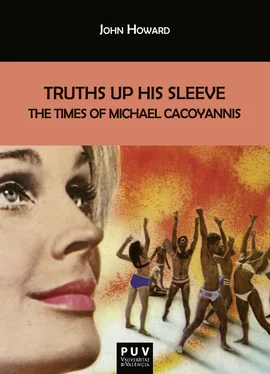Foremost, Michael “had the good luck to meet … artists” such as gay war veteran Yannis Tsarouchis, who after “the terrible experiences of recent years, show[ed] a profound understanding of the situation…. Their words sp[oke] of their sensitiveness, their great suffering, their optimism and their unfailing faith in Greece.” Echoing the sentiments of others, Michael determined that 36-year-old Tsarouchis was wise beyond his years. With appropriate discretion, Tsarouchis became a gay mentor to 24-year-old Michael. So moved was Michael in describing his Athens journey that he reassessed his own racial and national allegiances. Working on his script for a talk on the Cyprus service, he at first typed that he felt “like a Greek.” Then he x-ed it out and retyped it, to identify “as a Greek”—“a friend of every other Greek I would meet.” 39
Just before Athens, Michael had returned to Cyprus for the first time since 1938. As head of the BBC Cyprus service, broadcast across the island, Michael discovered he was a celebrity. Civic groups in Nicosia invited him to speak on a variety of topics ranging from BBC operations to life in wartime London. Even these he peppered with a poetry reading from Greek Olympic Hymn lyricist Kostis Palamas, who died in Nazi-occupied Athens just two years earlier. In Limassol, Michael met the latest additions to his large extended family and got reacquainted with others, including a nine-year-old cousin he’d last held as a baby, Maria Pitta. They had been instantly drawn to each other, and ever since, Michael’s mother had loaned the girl many of Stella and Michael’s books. Exercising his power over relatives, Michael told her parents they shouldn’t call her Maria: “Oh, what a common name!” As his cousin recalls, “He was an admirer of Marlene Dietrich, and he said, ‘Why don’t you call her Marlene?’ That’s how I got my name. I changed it afterwards” from the baptismal name Maria. “In my passport, I am Marlene.” Ironically enough, her namesake, Berlin’s famous bisexual non-believer, was named for Mary Magdalene, hence Marlene. 40
From household to household, Michael doled out presents to relatives. Back home, he offered gifts to his parents. To his mother, he likely gave a bottle of Penhaligon’s perfume. To his father, Michael presented his framed degree from Gray’s Inn. Michael wouldn’t need it anyway, he said, since he would never practice law. Furious at the impudence, Cacoyannis père exploded. Long disgusted with Michael as prissy, he announced he would no longer support this sissy. He cut Michael off. No more allowance. Anticipating it, Michael put his legal education to good use, fashioning a clever rejoinder. No, Michael would never join the family firm. However, since 21-year-old brother and war veteran George now proposed to study law, and since George knew little of London, next to nothing of Gray’s Inn, it was surely best that he move in with Michael at Portsea Hall— if their father paid the rent. After cooling off and discussing it with their mother, P. Cacoyannis agreed. Meeting with “Listeners’ Corner” correspondents during his final week in Cyprus, then transiting through Athens, Michael returned to London to enjoy his last several months of freedom: freedom from his family of origin, freedom to imbibe gay culture. 41
Two Greek-Cypriot barristers from Limassol recommended George to Gray’s Inn, and he was accepted to study law from early October 1946. Already workers had repaired many blitzed buildings, refitted stained glass windows removed as precaution, and constructed new temporary premises for the library, which Winston Churchill opened with fanfare. Michael gave George a job the very week he began at Gray’s Inn, assigning him the previous month’s news roundup. George had to read all the English reporting on Cyprus; prioritize, condense, and summarize it; then broadcast it over the Cyprus service. Increasingly identifying as communist— moved by Soviet war casualties, impressed by their nation’s sacrifices, and appalled by the Holocaust—George delivered an informative sympathetic account of Jews en route to Palestine trapped in Cyprus. George led with Fyfe Robertson’s Picture Post account of Jewish migrants detained near Famagusta in conditions reminiscent of the concentration camps. An additional paragraph, censored or cut for brevity, would have informed Cypriots that “Jews [were] seeking sanctuary from persecution [due to] the failure of the Great Powers to tackle the problem.” Nor was mention made of the vast indigenous Palestinian populations who greatly outnumbered Jewish settlers. As George also reported, protests continued in Cyprus against the imprisonment of eighteen trade union leaders of a miners’ strike. The Times of London parroted the colonial public prosecutor, who explained “the preaching [sic] of Marxism is prohibited in Cyprus by law.” Reporting on this dubious law, George thereby questioned its validity. As for his first year at Gray’s Inn, aside from flouting the rules against outside employment, George acquitted himself admirably. 42
The next year, in a stunning development, Stella enrolled at Gray’s Inn. Foil to George’s radical politics, Stella’s moderate centrism must have convinced their father in the end to support her application, regardless of gendered expectations, ever more conscious of her great abilities. In any case, he already paid rent on a London flat, and she could secure a public maintenance grant for students. Twenty-seven years after Mary Share Jones broke the barrier against women, Gray’s Inn still had not altered its application form. So Stella had to scratch out the word “son” and write that she was the “eldest daughter of Sir Panayiotis Cacoyannis[,] Advocate.” Not wishing to overtax George’s referees, Stella found two more lawyers from Limassol who agreed to recommend her. They instructed their secretaries to strikethrough the words “him” and “gentleman” on the standardized form and retype accordingly, so that each man could affirm, “I believe her to be a lady of respectability and a proper person to be admitted.” In Stella’s cohort, scarcely seven percent of students were women: eight out of 116. Of these women, Stella was the only one from outside Northwestern Europe. Gray’s Inn publication Graya listed these eight women as “Miss” or, in one case, “Mrs.” Men’s marital status was not provided. The new class members were listed not alphabetically but “by seniority.” At 27, Stella fell at the midpoint or median age, which was higher than normal after the war. Now, the Royal Air Force veteran would show everyone her capacities and her dedication to the law. In junior moot court during her second year, for example, Stella and her co-counsel successfully represented Fairdeal Insurance in a complicated negligence case between car buyer Nitwit and seller Toper, who was behind the wheel in a drunken crash badly injuring Nitwit. 43
As Stella too moved into Portsea Hall, Michael’s performances in the provinces gave him respite from family, as did visits to London moviehouses and bathhouses. As historian Mark Glancy has shown, “many people went to the cinema simply to stay warm [or] to get away from their family or fellow lodgers in crowded accommodation.” “Or, if they were away from home,” Glancy added, as when Michael was on the road for try-outs or with touring productions, they could “find comfort in a familiar form of entertainment.” Likewise, whether Hyde Park in London or River Ouse footpaths in York, an ordinary evening walk could free Michael of relatives and increase opportunities to meet men. Back in London, as scholar Matt Houlbrook has demonstrated, men of all classes socialized and had sex at Turkish bathhouses, particularly the two near Marble Arch and the one near Michael’s office, where in all likelihood he met Lindsay Anderson, who began making documentary films in the late 1940s. Because men like Michael lived with family members and next door to nosy neighbors, they desperately needed these inconspicuous safe spaces. Bringing gay friends or sex partners home would have generated suspicion, fueled rumors, and ultimately risked imprisonment. Soon enough, Gray’s Inn graduate David Maxwell Fyfe, as Home Secretary, would make gay men’s existence a living hell. 44
Читать дальше











